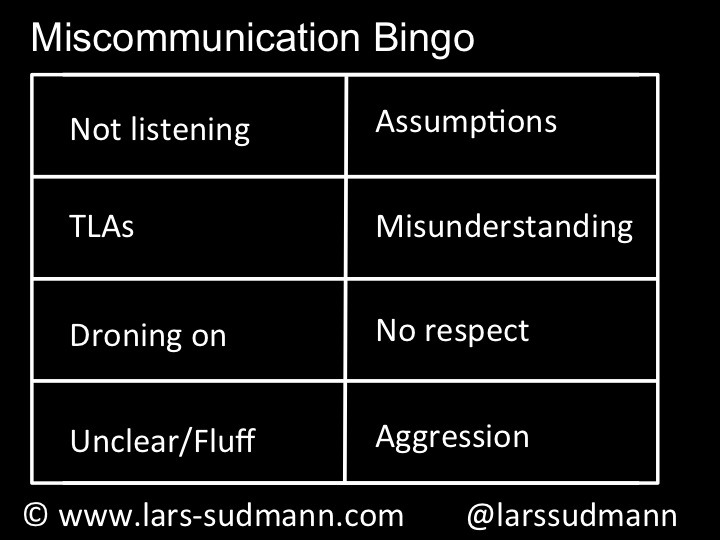Do you often attend meetings? Are some of them bad?
I guessed so. Here is my idea for you: When you attend a meeting, try to assess the following bad communication patters and play “Miscommunication Bingo”.
Here are the “eight villains” of great meeting communication and team performance. Do you recognize some of them?

- Step 1: Print the sheet out, put it somewhere where only you can see it.
- Step 2: Every time you notice one of the patterns you make a cross in the respective box.
- Step 3: Once you have all eight, you have experienced the perfect “bad communication meeting” and you just scream “Bingo” (Ok, maybe you do not scream but say it for yourself.)
Here an overview of the eight patterns, with some strategies for you to not fall into these traps. The eight are not completely mutually exclusive but rather feed on each other in a communication downward spiral.
Assumptions: These are my favorite ones. “Ah, I thought you meant this…” I have to admit that I am guilty of this also often. To avoid this yourself, always remember: if you assume, you make an ass out of u and me.
Droning on: These are the people who will not stop talking. The point has been made; it’s clear to everybody but hey, why not continue with another round of repetitions for another 10 minutes? Even the best and most willing listener looses interest by then. Be clear, be concise instead.
Aggressive Behavior: This is when comments like the following are being made. “Well, Lucy, that was not really well-thought through…” An obvious aggression, which is highly effective for silencing everybody in the meeting. Don’t do these, stay with the facts.
No respect: Similar to the above, but more subtle. Like rolling the eyes if somebody mentions something or laughing with your neighbor. Often seen in meetings.
Not listening: “This is my personal favorite. Also often combined with the effect of “everything has been said but not yet by everybody.” An endless loop where people are waiting to speak because they want to have airtime instead of going into a true dialogue. As a meeting leader, do not encourage this.
Misunderstandings: One meeting participant does not truly understand, however he or she combines what was heard with his or her prior agenda, their own map of the world. How to get out of this pattern is to force oneself to paraphrase often and ask “Have I understood you correctly, that______?”
Unclear / Fluff: This happens especially when people start to impress others of their knowledge etc. Often a word salad of cool or difficult sounding words start to appear, like: “We have to build a holistic cloud-based synergy solution” Yes, right. Try to avoid those and only use very concrete words. (By the way, you can also play a separate game called “BS bingo”, also good fun.)
TLAs: The killer of every good communication if you are not in the know. What are TLAs? This stands for three-letter acronyms, the common form of communication today. Every organization, every company has their own TLAs. The real fun starts if there are double uses and people start to misunderstand each other. Try to explain and define every abbreviation that you use.
And, how fast can you cry out “Bingo” in your meetings? The opposite game, “Great communication bingo”, is of course what you want to strive for. Less fun, but of course the stuff to go for as a team.
Lars Sudmann is an expert on high-performance leadership in global corporations. He works with multinational organizations as change consultant, keynote speaker as well as workshop facilitator. This article also appeared on his blog: www.lars-sudmann.com.
Image credit: Shutterstock.com



